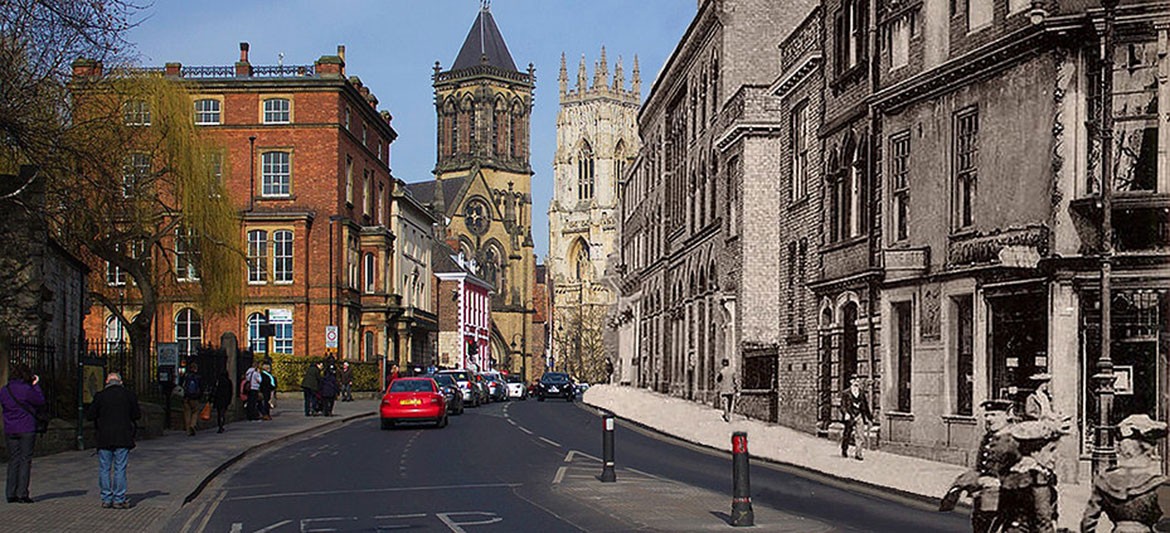How should York’s past influence its future?
That’s the question being asked at a one day event on Friday, March 25 – and the organisers want everyone to get involved.
It marks the beginning of a collaboration between York Past and Present, York Explore Libraries and Archives, York Environment Forum and Centre for Critical Studies in Museums, Galleries and Heritage, University of Leeds.
Little Vikings marquee, Parliament Street, York
Fri Mar 25 @ 10am-3pm
How should York’s heritage influence how we think about future planning and decision making? The tagline for the project is: “The past was different to today, the future will be too – what future do we want for York?”
[adrotate group=”4″]
Change things for the better
Want to know more? Here some of those involved in the project answer some of the fascinating questions thrown up by the project.
What activities will you be doing in the workshop?
York Past and Present will be using their powerful ‘Then and Now’ images to prompt discussion about the histories of housing in York. They’ll also be asking for York in three word response: What should York value? What should York change?
A key issue we are addressing is the problem on ‘consultation’.

Helen Graham, director, centre for critical studies in museums, galleries and heritage, University of Leeds, said:
Consultation, therefore, has a range of negative effects. Not least that the views that consultation processes enable often appear thin and uninformed.
As such the consultation often just exacerbates cynicism, from both decision makers and members of the public.
We want to explore more creative and fun alternatives, through engaging richer understandings, local memories and knowledge and collective hope – pasts and futures – to develop more dynamic engagements in local democracy.
Phil Bixby, chair of York Environment Forum, added:
Much current consultation founders on the misplaced belief in an enduring if imperfect present, rather than a belief that the future could be different, let alone better.
The Environment Forum is keen to help unlock the imagination of the public to work towards a more sustainable future for York

Why is it important to look back at the past to plan York’s future?
But actually archives are powerful tools for understanding change, for getting into the minds of our predecessors, and so better understanding our own motivations and actions.
Archives give context to what is happening now and help to reflect on what might be possible in the future.
– Victoria Hoyle, City Archivist
‘With age comes experience’
York Past and Present Facebook Group has over 12,000 members who regular share photos and memories and together represent enormous recourse of knowledge and creativity about York.
Richard Brigham and Lianne Brigham, administrators for the group said:
What do you hope to achieve on the day?
What will happen next?
This is the first event in an ongoing project. The overall aimed are:
Open exploration of visions for York’s future – starting with what individual people, families and communities want to do in their lives now and in the next 10, 20 and 30 years. We will do this through stalls, workshops and through online engagement.
Active engagement with York’s past to open up new perspectives on issues facing the city such as flooding and housing. We will do this through workshops at York Explore Libraries and Archives and walks through the city’s historic and green environments.
Deepening and extending understanding of the crucial issues that determine the city’s future and seeking alternative ways forward, We will do this through public talks and workshops, from green belt legislation to approaches to transport and engaging with new ideas and inspiring ways forward from elsewhere.
Developing resonant stories about the city and what the city might become through exploring new ways of working with lots of different types of contributions people might make from oral histories, memories and archive photos to workshop flip charts and post it notes and social media discussion and by creating a dynamic feedback loops to iteratively inform York’s public debate.
Feeding into policy making and decision making. We will do this by being proactive in involving York’s policy makers and decision makers as we go along, feeding into formal consultations (e.g. Local Plan and York Central) and opening up new ways for the city to approach ‘consultation’ in the future.
